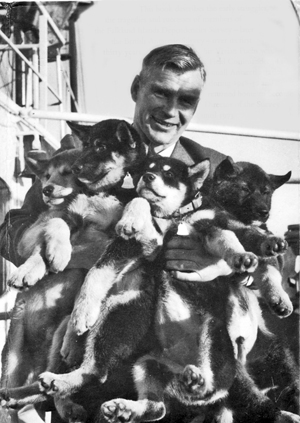Editorial: Know the Dog, the Land and the People
Fan Mail
Chinook Project Returns to Labrador
Canadian Animal Assistance Team Returns to Baker Lake
Ghosts of Dogs Past
A Conversation with
Charlotte DeWolff of Piksuk Media and
Jake Gearheard of the Ilisaqsivik Society
Qimmivut: the Ilisaqsivik Society’s Dog Team Workshop
Media Review: Of Ice and Men (book)
IMHO: Succession
Navigating This Site
Index of articles by subject
Index of back issues by volume number
Search The Fan Hitch
Articles to download and print
Ordering Ken MacRury's Thesis
Our comprehensive list of resources
Talk to The Fan Hitch
The Fan Hitch home page
ISDI home page
Editor's/Publisher's Statement
Editor: Sue Hamilton
Webmaster: Mark Hamilton
The Fan Hitch, Journal of
the Inuit Sled Dog, is published four times
a year. It is available at no cost online
at: https://thefanhitch.org.
The Fan Hitch welcomes your letters, stories, comments and suggestions. The editorial staff reserves the right to edit submissions used for publication.
Contents of The Fan Hitch are protected by international copyright laws. No photo, drawing or text may be reproduced in any form without written consent. Webmasters please note: written consent is necessary before linking this site to yours! Please forward requests to Sue Hamilton, 55 Town Line Rd., Harwinton, Connecticut 06791, USA or mail@thefanhitch.org.
This site is dedicated to the Inuit Dog as well as related Inuit culture and traditions. It is also home to The Fan Hitch, Journal of the Inuit Sled Dog.
The Fan Hitch welcomes your letters, stories, comments and suggestions. The editorial staff reserves the right to edit submissions used for publication.
Contents of The Fan Hitch are protected by international copyright laws. No photo, drawing or text may be reproduced in any form without written consent. Webmasters please note: written consent is necessary before linking this site to yours! Please forward requests to Sue Hamilton, 55 Town Line Rd., Harwinton, Connecticut 06791, USA or mail@thefanhitch.org.
This site is dedicated to the Inuit Dog as well as related Inuit culture and traditions. It is also home to The Fan Hitch, Journal of the Inuit Sled Dog.

Of Ice and Men
by Sir Vivian Fuchs
reviewed by Sue Hamilton
In 1966 renown British polar explorer Sir Vivian Ernest Fuchs (2/11/1908-11/13/1999) said, "The value of exploration lies in the gaining of knowledge, not in establishing a record." His book, Of Ice and Men, describes in vivid, sometimes intimate detail the long, glorious and occasioinally tragic road to achieving that knowledge in Antarctica, while purposefully eschewing the many record-setting feats accomplished by him and his fellow countrymen.
Fuchs (rhymes with "books"), was well positioned to be chronicling the history of the golden age of Antarctic exploration. With a Ph.D in geology, in 1947 he became field commander of the Falkland Islands Dependencies Survey (in 1962 to be renamed the British Antarctic Survey). In 1950 he was appointed Director of the Survey's scientific bureau. He was knighted in 1958, shortly after successfully leading a twelve-man team, dubbed the 1957-58 British Commonwealth Trans-Antarctic Expedition, a 99-day journey of about 2,158 miles. And he became Director of the British Antarctic Survey in 1958, the post he held for a productive fifteen years.

Sir Vivian Fuchs, image from
the back cover dust jacket.
Fuchs, who typically shunned publicity, openly criticized the 1994 Antarctic Treaty banning dogs from the continent. And his profound appreciation and respect for these animals can be found in Of Ice and Men. However, Inuit Dogs are not the focus of the book, although their essential role not only in achieving knowledge but also in the emotional relationship with the doggy men who worked with them, is clearly evident.
Of Ice and Men is a tribute to the men who served with the Falkland Islands Dependencies Survey/British Antarctic Survey and their ingenuity and human spirit, meeting challenge after unimaginable challenge during every day life at the bases as well as days, weeks, months in the field, struggling to survive, often by the learning curve of trial and error, accomplishing more than thought possible, proving time and time again that necessity is indeed "a mother of an inventor"!
Organizers of the British Antarctic Survey Monument Trust who in May 2011 arranged a dedication of memorials in the crypt of St Paul's Cathedral, London and outside the Scott Polar Research Institute, Cambridge, honoring the continent's scientists and explorers, particularly those who died in their quest for knowledge, have in part drawn on Fuch's beautifully written book for its ability to eloquently yet succinctly recount many of the stories of those who contributed so much.
In full disclosure, I have to admit that my appeal of Fuch's Of Ice and Men is in part due to the fact that I know or have met or have corresponded with many of the men he mentions. But with Fuch's compelling yet self-effacing writing style, his book will be enjoyed by everyone who is fascinated by the challenges of very extreme environments and the creative ingenuities invented, often out of urgent necessity, to exist in them. Of Ice and Men is indeed worthy of a place of honour in your polar library collection.
Of Ice and Men by Sir Vivian Fuchs (1982, Anthony Nelson, Publisher, ISBN: 9780904614060) is now out of print, but it available on the secondary market. Check out http://www.abebooks.com.